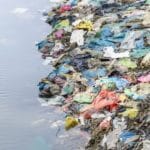
BERKELEY, CA—JUNE 17, 2020—Today, As You Sow released its Waste & Opportunity 2020: Searching for Corporate Leadership report analyzing the actions, or inactions, of 50 of the largest U.S. consumer-facing companies to reduce plastic pollution. In the face of growing worldwide concern about ocean plastic pollution, the report concludes that companies are far too slow in adopting responsive actions and promoting reusability, recyclability, or compostability in their packaging, and failing to shift away from wasteful packaging, toward circular models that prioritize absolute reduction.
Out of the 50 companies in the beverage, quick-service restaurant, consumer packaged goods, and retail sectors, the highest grade was a B- for Unilever. Twelve companies received C grades, 22 received D grades, and 15 received F grades. The six lowest ranked companies by size of revenue were Walmart, Kroger, PepsiCo, Tyson Foods, Kraft Heinz, and Mondelēz International. The high number of poor and failing grades reflects a lack of basic goal setting, strategy, and planning which must be developed to effectively address the plastic pollution crisis.
Plastic production is set to quadruple by 2050, yet only 14 percent of plastic packaging is recycled globally, and just 13 percent is recycled in the U.S. Single-use packaging is a major component of the up to 12 million pounds of plastic trash swept into waterways annually, threatening marine life. Plastics greatly contribute to climate change. By 2050, greenhouse gas emissions from plastic could reach 56 gigatons, or up to 13 percent of Earth’s entire remaining carbon budget.
“Companies have an absolute responsibility to reduce plastic pollution,” said Conrad MacKerron, As You Sow’s Senior Vice President and lead author of the report. “This report shows that the consumer goods industry is failing to address single-use plastics and take financial responsibility to improve recycling. We were unable to identify leadership companies, but rather found scattered leadership actions.”
Company actions were analyzed and graded on six pillars businesses must implement to address the plastics crisis: packaging design, reusable packaging, recycled content, data disclosure, voluntary support for improving recycling systems, and mandated financial responsibility to improve those systems.
The most progress was evident in pledges to redesign packaging to be reusable, recyclable, or compostable, followed by commitments to increase recycled content and actions to support recycling. There was notably less leadership in the areas of reusable packaging innovation, data transparency, and producer responsibility. These results indicate that companies have a long way to go to transition from single-use plastics to reusable alternatives, take financial responsibility to fix the U.S. recycling system to dramatically increase recycling yields, and deliver a more circular plastics economy.
“There’s a massive amount of work to be done,” said MacKerron. “This report provides a blueprint for what companies need to do to take responsibility for their plastic waste and move us to a circular economy for consumer packaging.”
Key recommendations:
Prioritize setting goals for reducing overall plastic use and using high levels of recycled content
Match packaging design to available recycling systems so more packaging can be recycled and not landfilled
Refrain from packaging more products in flexible plastic until these materials can be recycled
Contribute up to 1 percent of annual revenue to help finance the $12 billion in infrastructure upgrade and market development needed to dramatically increase recycling yields
Prioritize long-term contracts with recycling processors to signal serious commitment to use of recycled plastic feedstock and create a circular economy for plastic packaging
To learn more about As You Sow’s work on plastic pollution, click here.
Please use this URL when linking to the report it in your piece:http://www.asyousow.org/reports/waste-and-opportunity-2020-searching-corporate-leadership
MEDIA CONTACT: Stefanie Spear, [email protected], 216-387-1609
###
As You Sow is a nonprofit organization that promotes environmental and social corporate responsibility through shareholder advocacy, coalition building, and innovative legal strategies. See our resolutions here.